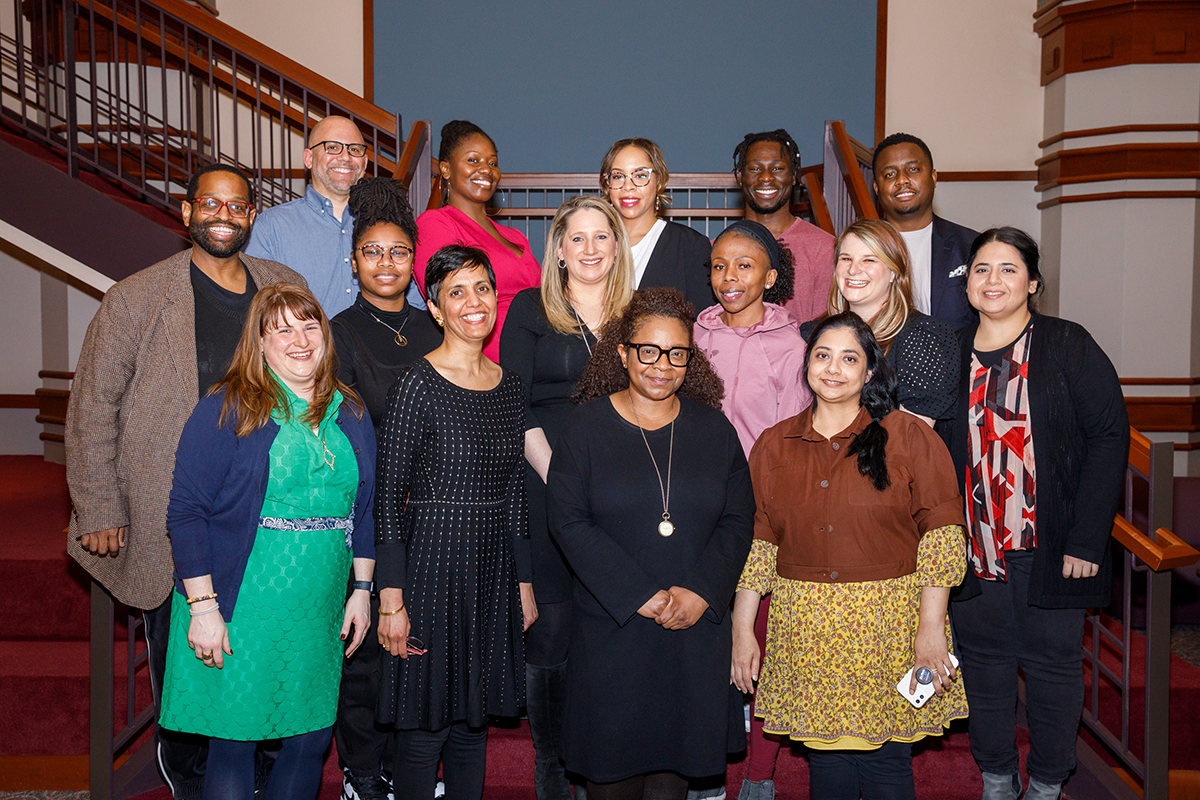
From left to right, bottom row: Virginia Head, Deepa Deshmukh, Regina Washington and Darakhshan Ahmed. Second row: David Lane, Kenyatta Forbes, Megan Nufer, Mary Keel, Caitlin Botsios and Syeda Ahmed. Top row: David Burns, Dana Todd Pope, Jamilla Parham, Oluwasey Olaleye and Claoe Louis (BUS ’07).
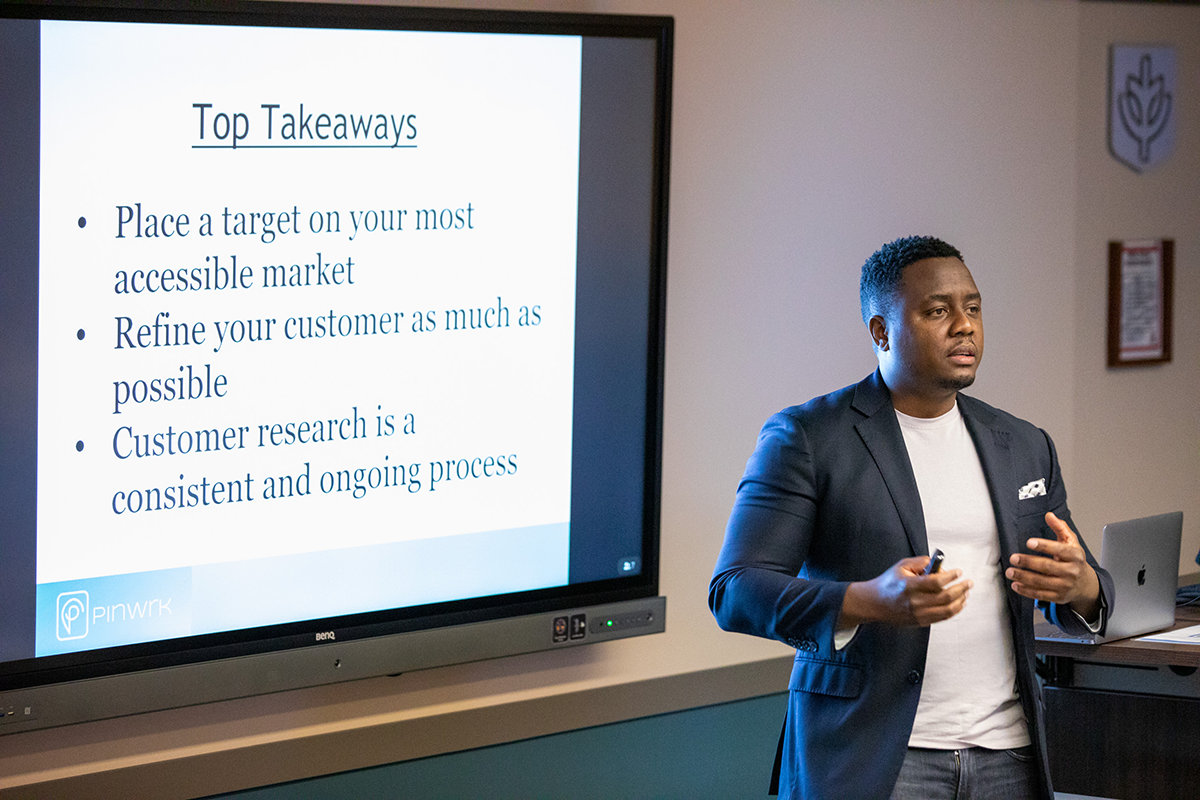
DePaul MBA student Claoe Louis (BUS ’07) presents his business during the Social Impact Incubator Program's final meeting on March 7.
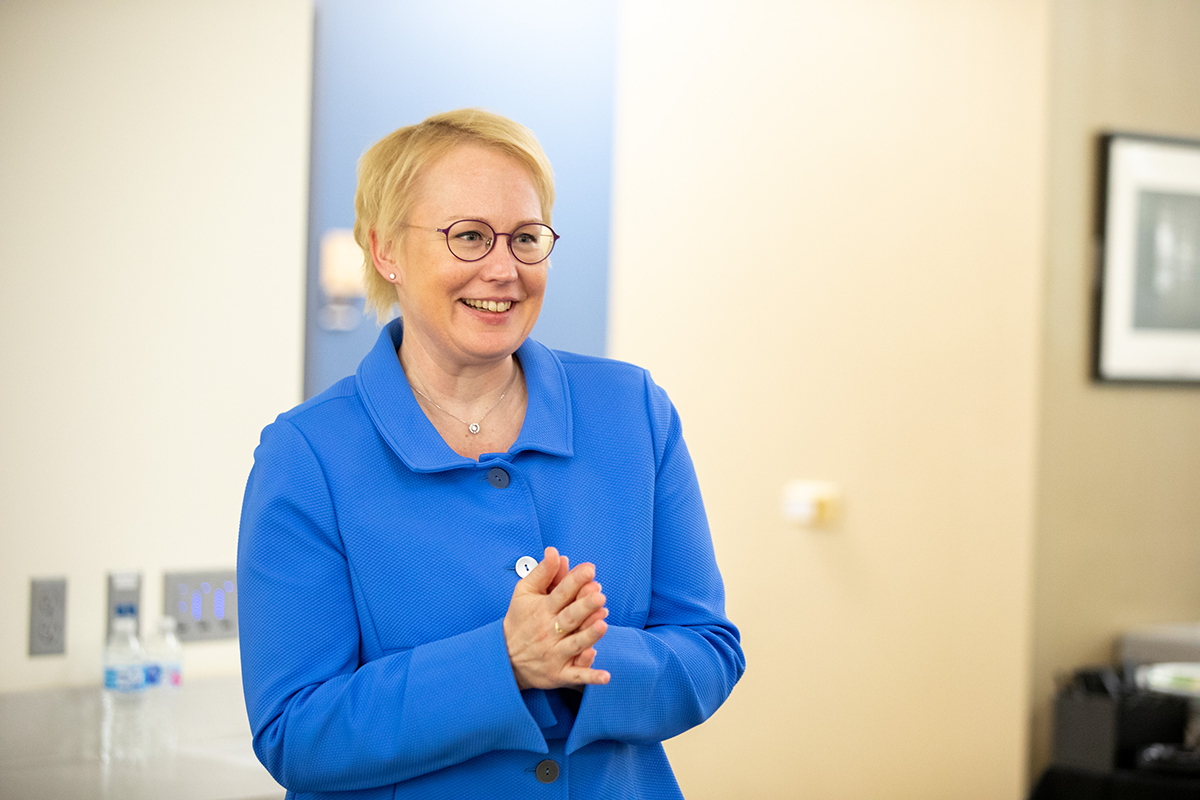
Maija Renko, Coleman Chair of Entrepreneurship, wanted to launch a program that taught entrepreneurs how to scale their businesses while making an impact.
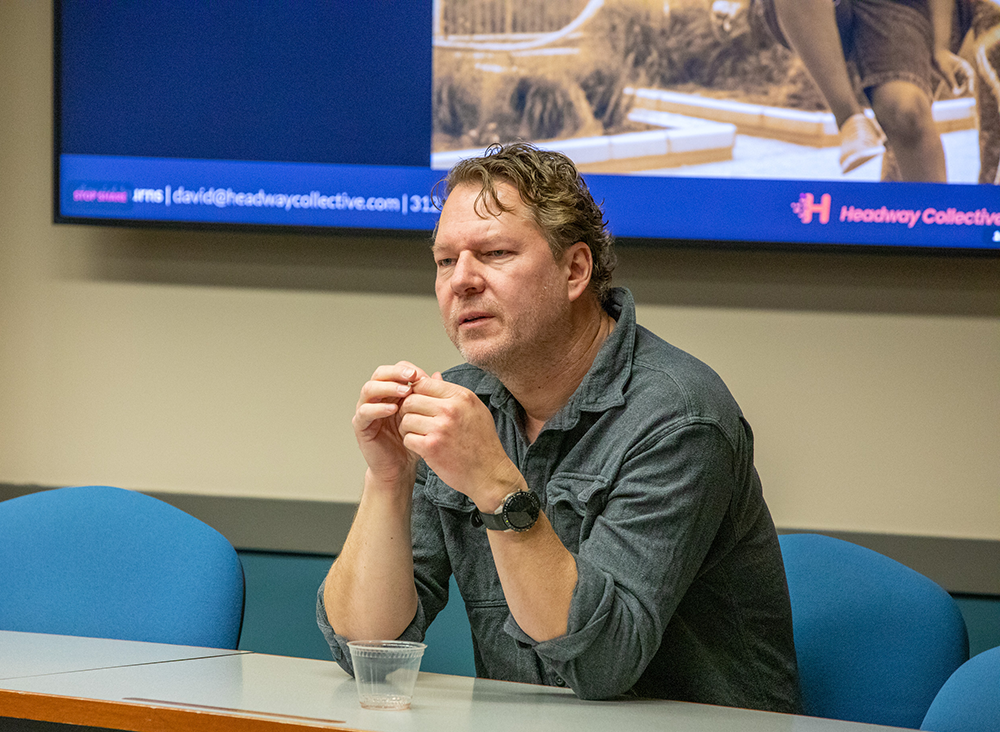
John Crosson (MBA ’95), an entrepreneur and angel investor, served as DePaul MBA student Claoe Louis's mentor throughout the Social Impact Incubator Program.
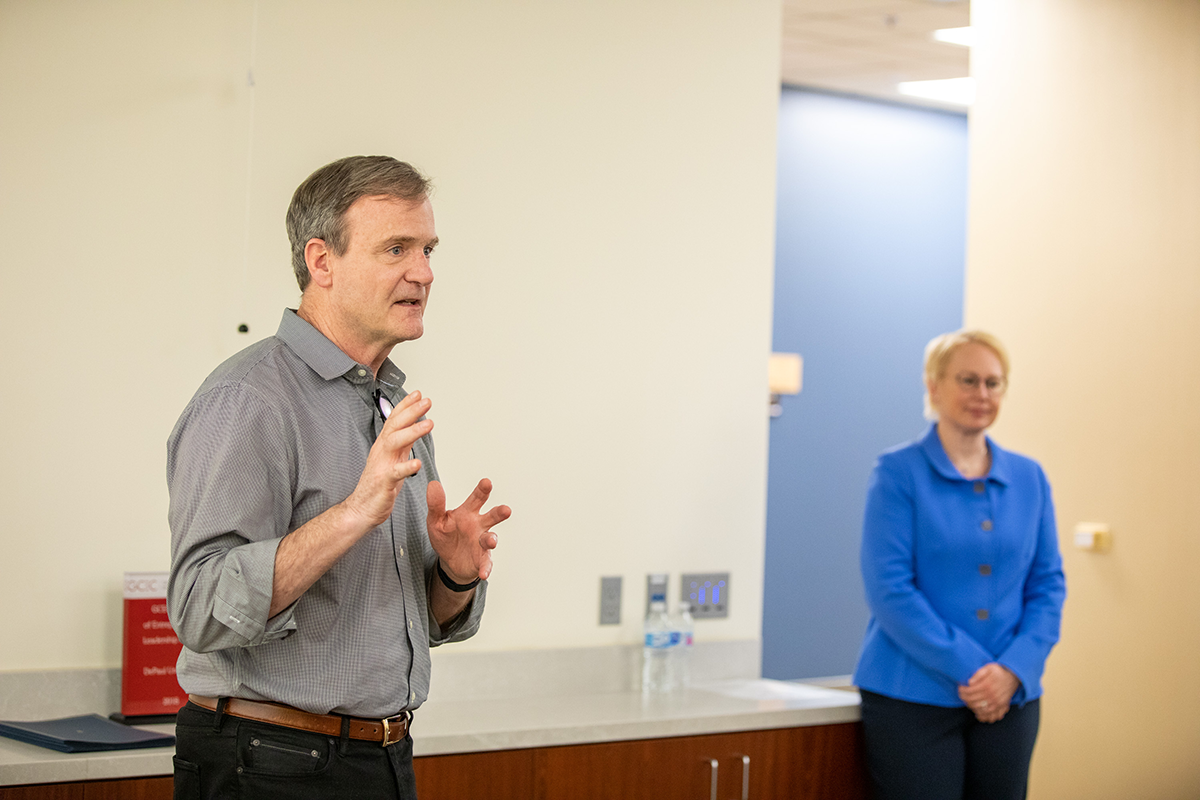
Executive Director of the Coleman Entrepreneurship Center Bruce Leech (left) welcomes guests and participants to the Social Impact Incubator Program's final gathering.
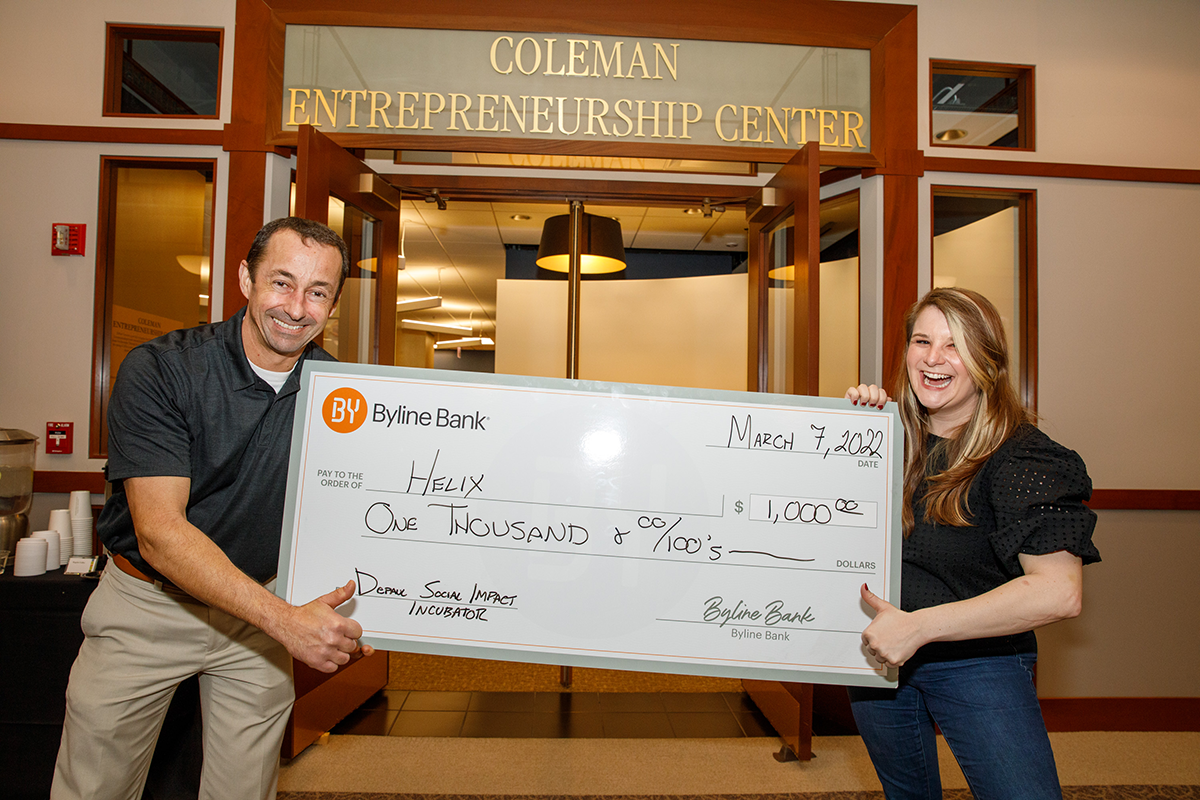
Stephen Ball (left), senior vice president at Byline Bank, presents a check to Caitlin Botsios, co-founder and executive director of Helix Chicago, a nonprofit that provides jobs to at-risk youth and in-school programming.
The
Coleman Entrepreneurship Center (CEC) is teaching entrepreneurship the DePaul way by uplifting entrepreneurs from the Chicago community alongside those from DePaul.
On Jan. 24, the CEC welcomed its first cohort of the inaugural Social Impact Incubator program, a six-week boot camp that provides practical guidance for entrepreneurs to scale and grow their
local businesses. Throughout the program, 15 participants – DePaul students and alumni as well as community members – gathered on Monday evenings to learn from entrepreneurs, DePaul faculty and subject matter experts.
CEC Executive Director Bruce Leech says he and Maija Renko, Coleman Chair of Entrepreneurship, wanted to launch a program that taught entrepreneurs how to financially grow their business while making an impact on the Chicago community. To be eligible for the program, participants had to have already established a legal entity for their startup.
“The students, the alumni and the community members we selected for the program seem to be in it for the right reasons, and they are benefitting from the conversations they’re having with each other,” Renko says.
Participants were asked to present their business plans during their first meeting, and again during the final meeting in early March, incorporating what they learned in the second pitch. “It’s not really about being good at pitching,” Leech says. “It’s more about the content and what they came in with and what they’re leaving with that will help them become successful afterward.” The CEC also partnered with Byline Bank to provide a $1,000 stipend to cohort members.
Another key component of the program is the one-on-one mentorship for participants. The CEC tapped its vast network of community and alumni entrepreneurs to match participants with a mentor who met with them once a week as well as once a month for six months following completion of the program.
DePaul MBA student Claoe Louis (BUS ’07) joined the program to help launch and grow his business Pinwrk, a mobile app that allows customers to connect with on-demand workers already scheduled to work in their area. Louis was matched with mentor John Crosson (MBA ’95), an entrepreneur and angel investor, who helped Louis identify his customer base for his business.
“I see a lot of companies that build great technology but it’s not always aligned with what the customer wants and needs,” Crosson says. “I wanted to be sure that we spent sufficient time uncovering the problems and making sure that the solution solved that problem and was valuable.”
Crosson adds that he was motivated to serve as a mentor in his program because he personally benefitted from mentor relationships when launching his own startups. “Working with DePaul students is very special,” he says. “While it’s been a long time since I attended
DePaul for my MBA and also since starting my first company, I remember those early days and love that I get to help my fellow Blue Demons.”
For Louis, running his own business was always a dream from a young age. A native of the Caribbean island Saint Lucia, Louis worked in the technology field as a software engineer and manager for 12 years before returning to DePaul to pursue his MBA. “My mentality then was that you had to have all the skills to pull it off,” he says. “It wasn’t until a little later that I realized you just need the willingness to learn along the way.”
Although Louis has participated in several of the CEC’s programs – including the
2021 Hackathon Challenge – he says the Social Impact Incubator helped him identify his primary customer while providing him access to practical resources. “One of the things that the incubator helped me focus on is when launching a startup, don’t get overwhelmed by thinking about the overall market potential,” he says. “Think about your most accessible market first. And then organically grow from there.”
Leech says he and Renko designed the program so that entrepreneurs could learn about practical tools and tips they could immediately apply to their business, such as online marketing that improves search engine optimization. In addition, the mix of alumni, student and community members provided a camaraderie that helped the cohort learn and network with one other.
“We’ve got a very, very diverse group both demographically and business-wise,” Leech says. “And yet they’re all coming together with a common bond to learn from our content, and just as importantly – if not more so – to be there to support each other during those six weeks.”
Learn more: